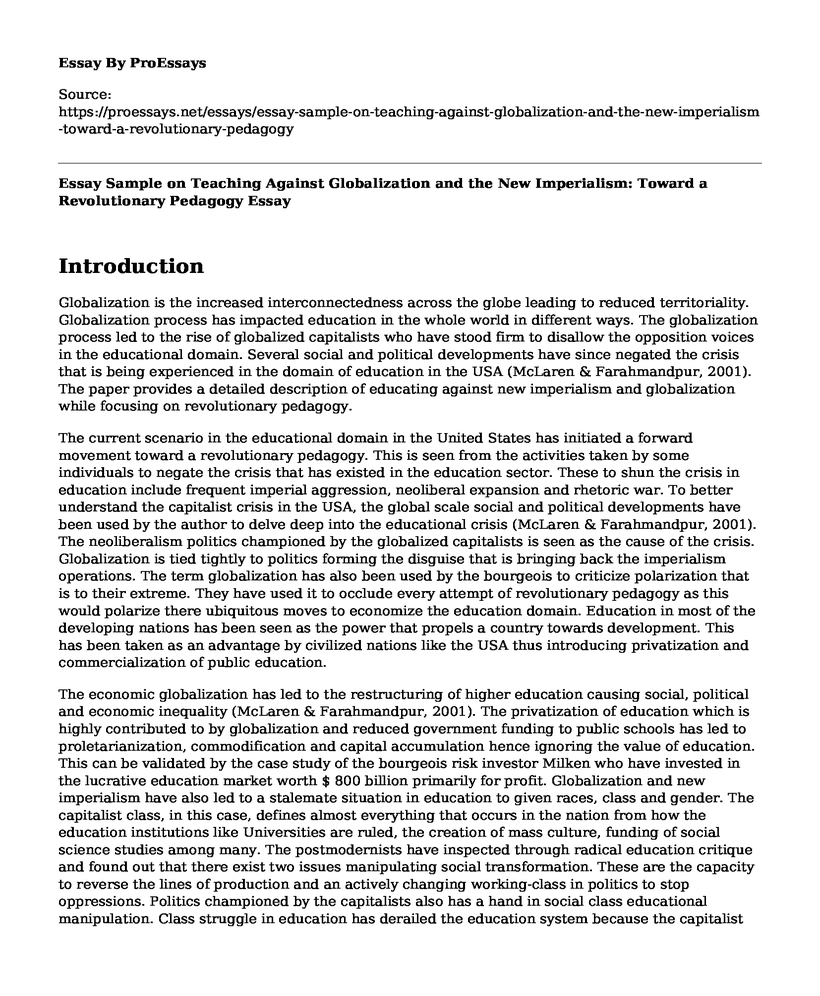Introduction
Globalization is the increased interconnectedness across the globe leading to reduced territoriality. Globalization process has impacted education in the whole world in different ways. The globalization process led to the rise of globalized capitalists who have stood firm to disallow the opposition voices in the educational domain. Several social and political developments have since negated the crisis that is being experienced in the domain of education in the USA (McLaren & Farahmandpur, 2001). The paper provides a detailed description of educating against new imperialism and globalization while focusing on revolutionary pedagogy.
The current scenario in the educational domain in the United States has initiated a forward movement toward a revolutionary pedagogy. This is seen from the activities taken by some individuals to negate the crisis that has existed in the education sector. These to shun the crisis in education include frequent imperial aggression, neoliberal expansion and rhetoric war. To better understand the capitalist crisis in the USA, the global scale social and political developments have been used by the author to delve deep into the educational crisis (McLaren & Farahmandpur, 2001). The neoliberalism politics championed by the globalized capitalists is seen as the cause of the crisis. Globalization is tied tightly to politics forming the disguise that is bringing back the imperialism operations. The term globalization has also been used by the bourgeois to criticize polarization that is to their extreme. They have used it to occlude every attempt of revolutionary pedagogy as this would polarize there ubiquitous moves to economize the education domain. Education in most of the developing nations has been seen as the power that propels a country towards development. This has been taken as an advantage by civilized nations like the USA thus introducing privatization and commercialization of public education.
The economic globalization has led to the restructuring of higher education causing social, political and economic inequality (McLaren & Farahmandpur, 2001). The privatization of education which is highly contributed to by globalization and reduced government funding to public schools has led to proletarianization, commodification and capital accumulation hence ignoring the value of education. This can be validated by the case study of the bourgeois risk investor Milken who have invested in the lucrative education market worth $ 800 billion primarily for profit. Globalization and new imperialism have also led to a stalemate situation in education to given races, class and gender. The capitalist class, in this case, defines almost everything that occurs in the nation from how the education institutions like Universities are ruled, the creation of mass culture, funding of social science studies among many. The postmodernists have inspected through radical education critique and found out that there exist two issues manipulating social transformation. These are the capacity to reverse the lines of production and an actively changing working-class in politics to stop oppressions. Politics championed by the capitalists also has a hand in social class educational manipulation. Class struggle in education has derailed the education system because the capitalist occupies the production areas in the sector thus having voices. The only way to eliminate this is to support postmodernist in fighting for the social class struggle.
One of the revolutionary ways to eliminate the working class pedagogy is to engage in strong critiquing, by struggling over meaning production to transform the marginalized oppression by the capitalists. Teachers as high revolutionary intellectuals should put sense on the workers, other intellectuals and students by examining the disguised democracies and freedom initiated by neoliberal capitalists. The working class are significant in revolutionary pedagogy, thus to be certain of better results, they should have the following qualities. They should actively engage in the construction of long-standing hostility and social life. Create pedagogical conditions that are of critical consciousness to transform the current social conditions and topple the economic alienations. The revolutionary teachers should also introduce subjects that help the students to counteract the existing regimes.
Conclusion
In conclusion, globalization which is the prerequisite to capitalism is a retrogressive concept that has stagnated development and transformation in the USA. It has dominated all the sectors from social, political and economic sectors through to education domain. The better ways to oust it is through creating a constant financial crisis and wars against the capitalists. The other means to stop capitalist is to ensure redistribution of resources by ending privatization and capital concentration biasness.
Reference
McLaren, P., & Farahmandpur, R. (2001). Teaching against globalization and the new imperialism: Toward a revolutionary pedagogy. Journal of Teacher Education, 52(2), 136-150.
Cite this page
Essay Sample on Teaching Against Globalization and the New Imperialism: Toward a Revolutionary Pedagogy. (2022, Nov 17). Retrieved from https://proessays.net/essays/essay-sample-on-teaching-against-globalization-and-the-new-imperialism-toward-a-revolutionary-pedagogy
If you are the original author of this essay and no longer wish to have it published on the ProEssays website, please click below to request its removal:
- The Village Toy Shop: Toys and Playthings Essay
- Response Essay: English as a Second Language (ESL)
- National Incident Management Lessons Paper Example
- Essay Sample on Video Games & Negative Impact on Kids: Effects & Solutions
- Essay on Nurse Practitioners: Impact of Regulatory Policies on Advanced Practice Nursing
- Autobiography Study
- Essay Example on Aspiring Nurse: Pursuing My Dream to Positively Impact Lives







